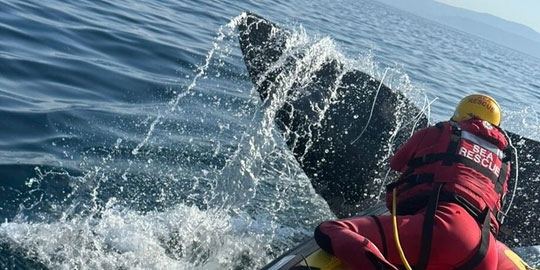Whales navigating the vast oceans surrounding South Africa often fall prey to the spinoffs of human activity. They become ensnared in fishing gear or abandoned nets, which can lead to severe injury or death. Fortunately, these gentle giants have an ally in the South African Whale Disentanglement Network (SAWDN).
The National Sea Rescue Institute (NSRI) explained that the SAWDN was established in 2006 to “manage entangled whales using specialised equipment and is composed of trained volunteers” from reputable organisations involved in the maritime domain. Their work covers the entire South African coastline.
Most recently, they made news on Wednesday when they helped free a whale entangled in fishing rope offshore of Miller’s Point in the Western Cape.
Distressed & panicked #Humpback whale entangled off Miller’s Point, #CapeTown, this morning. Only posting this tragic footage because the animal was freed by @NSRI #SAWDN shortly afterwards! All credit to local whale hero Nanette Smith for spotting the animal and saving its life! pic.twitter.com/U2RMFWi52h
— Seafari (@SeafariApp) September 18, 2024
Nanette Smith, who describes herself as “an obsessed whale watcher”, alerted authorities to the situation.
She said, “Cape Town has incredible ocean life and what people don’t realise is that we can see whales and/or dolphins on most days around our immediate coast, from False Bay all the way around to the Atlantic Seaboard side.
“Only on 27 days so far this year did I not see whales or dolphins. Whales have a certain enigma to them, and I guess that’s what people enjoy about them.
“So, by spending so much time with whales on a daily basis, I guess it was inevitable that I would one day encounter an entangled whale, and that happened on Wednesday, 18 September.
“While doing my daily whale check of our bay I found a juvenile humpback off Miller’s Point, clearly in distress. I immediately raised the alarm with NSRI and after their assessment of the situation they agreed that the SAWDN team needs to be activated.”
Michael Meyer, the operations manager at SAWDN, said: “Unfortunately, when whales come into contact with fishing gear, their first reaction is to spin, since that is how to avoid predators. [This] is the worst thing they can do as it ultimately leads to more wraps around the body and more serious damage to the animal.
“When one sees their futile attempts to get rid of the gear, which often results in embedded ropes in the body and damage to the flippers and tail, one cannot but be motivated.”
The NSRI said two NSRI SAWDN crew boats were launched from Simon’s Town and found a juvenile humpback whale “appearing to have wraps of fishing rope around the tail and body, with the whale appearing to be anchored to the sea bed”.
They used specialised cutting equipment to remove four wraps of fishing rope from the whale's tail and one from its body. Throughout the operation, a larger whale, assumed to be the mother, stayed close by.
The team successfully lifted the fishing line anchored to the seabed, allowing them to access and cut the ropes. After three cuts, the whale was freed and swam off with the larger whale.
Smith said, “It is reassuring to know we have these dedicated heroes around our coast, always at the ready to help where our whales need them. I take my hat off to these dedicated teams who sometimes put their own lives at risk to save those of our beautiful ocean creatures.” DM
https://www.youtube.com/watch?v=REeWvTRUpMk





